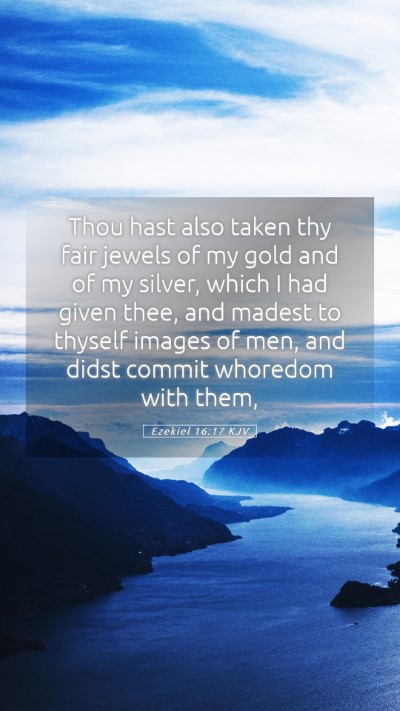Ezekiel 16:17 - Understanding the Verse
Bible Verse: Ezekiel 16:17
"Thou hast also taken thy fair jewels of my gold and of my silver, which I had given thee, and made to thyself images of men, and didst commit whoredom with them."
Summarized Meaning
Ezekiel 16:17 highlights a profound moment of betrayal in the relationship between God and Israel. In this verse, God laments how the Israelites have taken the gifts He bestowed upon them, particularly gold and silver, and used them to create idols. This act signifies spiritual infidelity and a turning away from God’s commandments, drawing insightful commentary from various biblical scholars.
Bible Verse Analysis
According to Matthew Henry, this verse starkly illustrates how God's greatest gifts are turned into instruments of sin. The "jewels of gold and silver" represent the blessings and resources provided by God, which the Israelites used for idolatry. This reflects a severe breach of trust and fidelity, as these gifts should have been used to honor God instead of creating false images. The action of making idols signifies not merely a physical act of worship but a spiritual and relational crime against God.
Albert Barnes adds that the term "images of men" speaks to the creation of deities that resemble human forms, an action steeped in the cultural practices of surrounding nations. This propensity to adopt foreign customs led to a deepening void in their relationship with God. The abandonment of Yahweh for these idols underscores a crucial theme in biblical exegesis: the tendency of humans to bow down to what they have created rather than the Creator.
Adam Clarke’s commentary expands on the implications of this verse, noting that the act of “committing whoredom” represents Israel’s covenant unfaithfulness. Here, Clarke interprets the use of sexual imagery as a metaphor for idolatry — Israel's preference for idols over God is akin to marital infidelity. The underlying suggestion is grave: God’s warnings are ignored as people persist in their waywardness.
Key Themes in Ezekiel 16:17
- Idolatry: The verse profoundly depicts the rejection of God's authority in favor of man-made deities.
- Spiritual Adultery: The metaphor of whoredom illustrates the severity of Israel's infidelity against their covenant with God.
- Divine Betrayal: God's gifts, when misappropriated, reflect a profound ingratitude and a painful breach of the relationship between Creator and creation.
Application to Daily Life
Understanding Ezekiel 16:17 calls for self-reflection for believers today. It challenges individuals to consider how they utilize God’s blessings in their lives. Are they directing their resources and talents towards divine purposes, or are they tempted to use them for selfish or idolatrous pursuits? This reflection is essential for true spiritual growth.
Related Bible Verses
- Exodus 20:4-5: "Thou shalt not make unto thee any graven image..." - A directive against idolatry.
- Isaiah 44:9-10: Discusses the foolishness of idol-making and the true nature of God.
- James 4:4: "Adulterers and adulteresses! Do you not know that friendship with the world is enmity with God?" - Highlights the call to faithfulness to God.
Conclusion
Ezekiel 16:17 serves as a critical reminder of the importance of fidelity in our relationship with God. The blessings provided to us are not to be misused but cherished and directed toward honoring Him. Bible verse interpretations like these are pivotal for deepening one's understanding of Scripture and cultivating a faithful heart.


